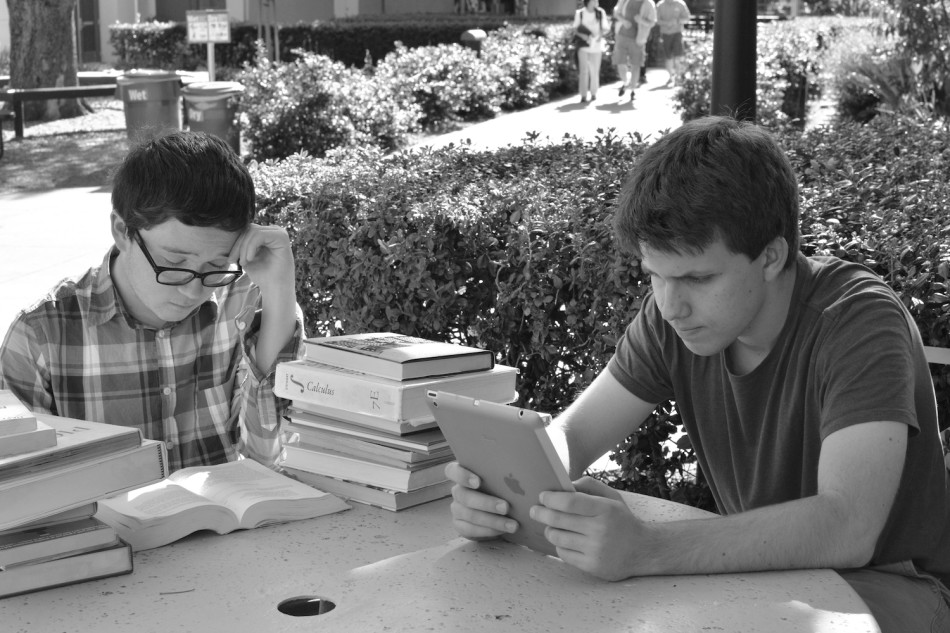E-Textbooks revolutionize studying
Damon Aitken (12) studies for a test using physical textbooks, while Nicky Semenza (12) opts to use an iPad instead. Digital textbooks have become more prevalent among Upper School students since the administration allowed e-readers to be used in classrooms one year ago.
As the digital world expands and e-books become increasingly popular for both recreation and education, many students at Harker are now choosing to use online textbooks and PDF files instead of physical copies.
E-books are often more convenient than physical textbooks, as they are weightless and save space in backpacks. Online copies are also difficult to lose, eliminating another potential problem for students. At the Upper School, where many homework assignments are now computer-based, e-books are often more immediately usable.
“Using a digital version of the chemistry book is so much more efficient, as people can compare the problems and the solutions side by side without needing to flip back and forth throughout the book,” Ameek Singh (10) said.
Some students also found navigating text on computers easier than on old-fashioned paper.
“Online textbooks are helpful because I can search up important terms, record them, and later use them to study,” Sina Mehran (12) said.
Calculus teacher Anthony Silk noted that the easy accessibility of e-books also indirectly benefits teachers.
“I think PDF textbooks are of great advantage to students as they are are able to bring them to school by iPad, by iPhone, laptop, or some non-apple product,” he said. “That way, students will have easy access to them all the time. At least you can expect them to have [their books].”
However, the legality of e-books, especially PDF copies of textbooks, remains a concern. Some students seek to save money by using peer-to-peer file-sharing websites to download their textbooks. This is almost always illegal and problematic for both publishing companies and authors. Other students share files among themselves via USB or AirDrop.
“I think the concept of digital textbooks is good, but there are always people who will misuse it by pirating the materials online,” Justan Su (10) said. “But that’s pretty much true for any technology that happens to appear on the market.”
Library assistant Victor Squillacioti sympathized with students who choose to download their books, citing rising textbook prices.
“I wouldn’t say that it is a completely morally correct thing to do, and I’m not sure I support it,” he said. “[But] I understand people who are driven to do that, as textbook prices are outrageous.”
Digital textbooks have been a recent edition to this ever-expanding technological world and are making learning more and more convenient for many. On the other hand, just as anything can be abused and used the wrong way, digital textbooks are not exempt from malusage.
This piece was originally published in the pages of the Winged Post on May 16, 2014.

Stanley Zhao (12) is the business manager of the Winged Post. He is a senior this year. Stanley is part of the math club and is currently conducting a...

Meilan Steimle (12) is co-Editor-in-Chief of the Winged Post. She was a reporter her freshman year, Winged Post Opinion Editor her sophomore year and Winged...


















![“[Building nerf blasters] became this outlet of creativity for me that hasn't been matched by anything else. The process [of] making a build complete to your desire is such a painstakingly difficult process, but I've had to learn from [the skills needed from] soldering to proper painting. There's so many different options for everything, if you think about it, it exists. The best part is [that] if it doesn't exist, you can build it yourself," Ishaan Parate said.](https://harkeraquila.com/wp-content/uploads/2022/08/DSC_8149-900x604.jpg)




![“When I came into high school, I was ready to be a follower. But DECA was a game changer for me. It helped me overcome my fear of public speaking, and it's played such a major role in who I've become today. To be able to successfully lead a chapter of 150 students, an officer team and be one of the upperclassmen I once really admired is something I'm [really] proud of,” Anvitha Tummala ('21) said.](https://harkeraquila.com/wp-content/uploads/2021/07/Screen-Shot-2021-07-25-at-9.50.05-AM-900x594.png)







![“I think getting up in the morning and having a sense of purpose [is exciting]. I think without a certain amount of drive, life is kind of obsolete and mundane, and I think having that every single day is what makes each day unique and kind of makes life exciting,” Neymika Jain (12) said.](https://harkeraquila.com/wp-content/uploads/2017/06/Screen-Shot-2017-06-03-at-4.54.16-PM.png)








![“My slogan is ‘slow feet, don’t eat, and I’m hungry.’ You need to run fast to get where you are–you aren't going to get those championships if you aren't fast,” Angel Cervantes (12) said. “I want to do well in school on my tests and in track and win championships for my team. I live by that, [and] I can do that anywhere: in the classroom or on the field.”](https://harkeraquila.com/wp-content/uploads/2018/06/DSC5146-900x601.jpg)
![“[Volleyball has] taught me how to fall correctly, and another thing it taught is that you don’t have to be the best at something to be good at it. If you just hit the ball in a smart way, then it still scores points and you’re good at it. You could be a background player and still make a much bigger impact on the team than you would think,” Anya Gert (’20) said.](https://harkeraquila.com/wp-content/uploads/2020/06/AnnaGert_JinTuan_HoHPhotoEdited-600x900.jpeg)

![“I'm not nearly there yet, but [my confidence has] definitely been getting better since I was pretty shy and timid coming into Harker my freshman year. I know that there's a lot of people that are really confident in what they do, and I really admire them. Everyone's so driven and that has really pushed me to kind of try to find my own place in high school and be more confident,” Alyssa Huang (’20) said.](https://harkeraquila.com/wp-content/uploads/2020/06/AlyssaHuang_EmilyChen_HoHPhoto-900x749.jpeg)



